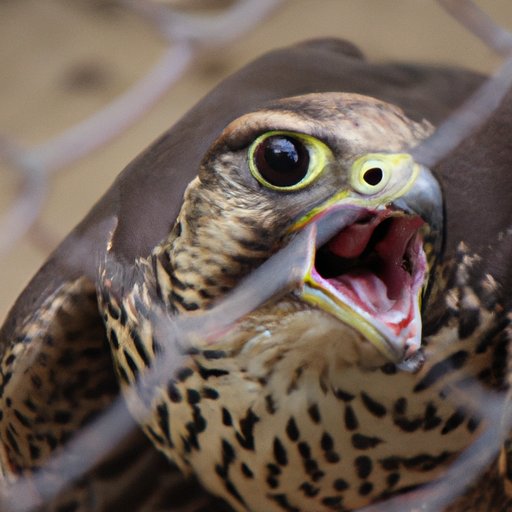Introduction
Predators are important components of an ecosystem and play a key role in maintaining balance in the food chain. In scientific terms, a predator is an organism that hunts, kills and consumes another living organism, known as its prey. Predators exist in all ecosystems, from land to sea and air, and come in a variety of shapes and sizes.
Examining the Different Types of Predators
There are three main types of predators: carnivores, omnivores, and parasites. Carnivores are animals that only feed on other animals, such as lions, tigers, and wolves. Omnivores, such as bears and raccoons, consume both plants and animals. Parasites, such as ticks and fleas, rely on other organisms for their sustenance, but do not necessarily kill their hosts.

How Predators Impact the Food Chain
Predators play an essential role in the food chain by keeping prey populations in check and helping to regulate the number of herbivores in an ecosystem. This is because when prey populations become too large, they can overgraze vegetation and cause damage to the environment. By controlling the size of the prey population, predators help maintain healthy populations of plants and animals in an ecosystem.
The relationship between predators and prey is complex and dynamic, with both species relying on each other to survive. For example, when predators are abundant, they help keep prey populations in check and prevent them from depleting resources in an ecosystem. Conversely, when prey populations are low, predators have fewer food sources and may struggle to survive.

Exploring the Benefits of Predators in an Ecosystem
In addition to regulating prey populations, predators also provide other benefits to an ecosystem. For instance, predators help maintain genetic diversity within a species by selecting for individuals with certain traits that enable them to survive. In this way, predators act as agents of natural selection by favoring the survival of the fittest.
Furthermore, predators play an important role in disease control. By preying on sick or weakened animals, predators reduce the spread of disease in an ecosystem and help keep populations healthy. Additionally, predators help to disperse seeds and nutrients throughout an area, which helps to promote plant growth and biodiversity.
Human Interference on Predators
Unfortunately, human activities such as hunting, habitat destruction, and pollution have had a negative effect on predators in many ecosystems. As humans encroach on wild areas, they disrupt the delicate balance between predators and prey, often leading to decreased populations of both. Additionally, human activities can lead to the depletion of resources, such as food and water, which can further threaten predators.
In addition, climate change has had a profound effect on predators. Changes in temperature and precipitation patterns can affect the availability of food and water, making it more difficult for predators to find sustenance. Furthermore, rising temperatures can increase the risk of disease, which can further threaten predators.

Examining Possible Solutions to Protect Predators
In order to protect predators, it is important to reduce human impacts on their habitats. One way to do this is to establish protected areas where predators can live without fear of being hunted or disturbed. Additionally, governments and non-governmental organizations can work together to create laws and regulations that protect predators from hunting and poaching.
It is also important to restore habitats that have been damaged by human activities. This can be done by planting native vegetation, reestablishing wetlands, and creating corridors that allow predators to move freely between different areas. Additionally, education and outreach programs can help raise awareness about the importance of predators and how to protect them.
Conclusion
In conclusion, predators play an important role in maintaining balance in the food chain and providing other benefits to an ecosystem. Unfortunately, human activities such as hunting, habitat destruction, and pollution have had a negative effect on predators in many ecosystems. To protect predators, it is important to reduce human impacts on their habitats and restore damaged habitats. Additionally, education and outreach programs can help raise awareness about the importance of predators and how to protect them.
(Note: Is this article not meeting your expectations? Do you have knowledge or insights to share? Unlock new opportunities and expand your reach by joining our authors team. Click Registration to join us and share your expertise with our readers.)
